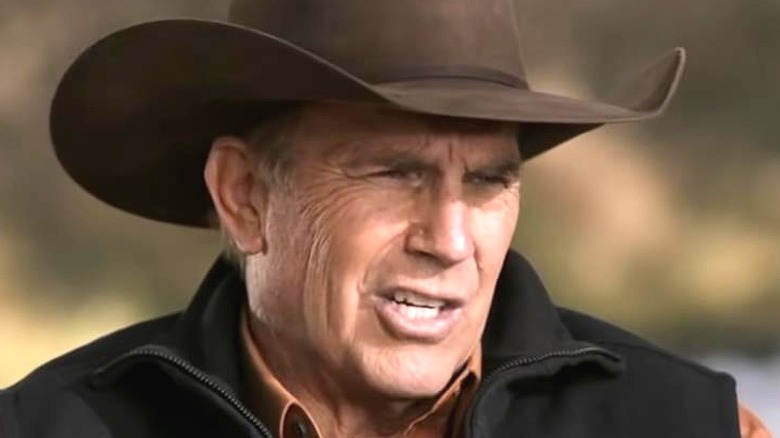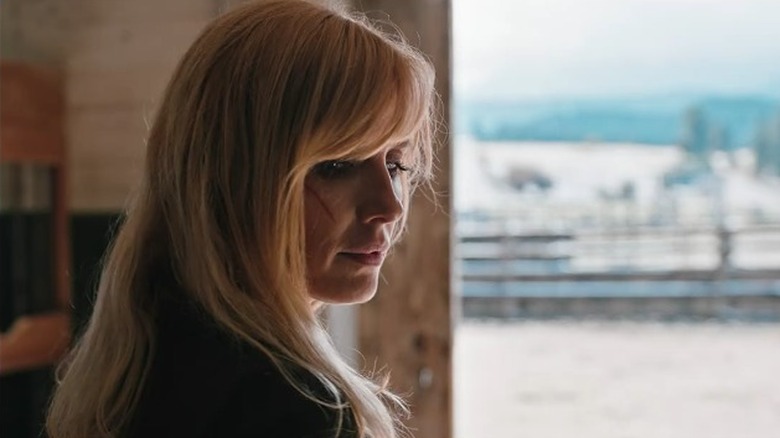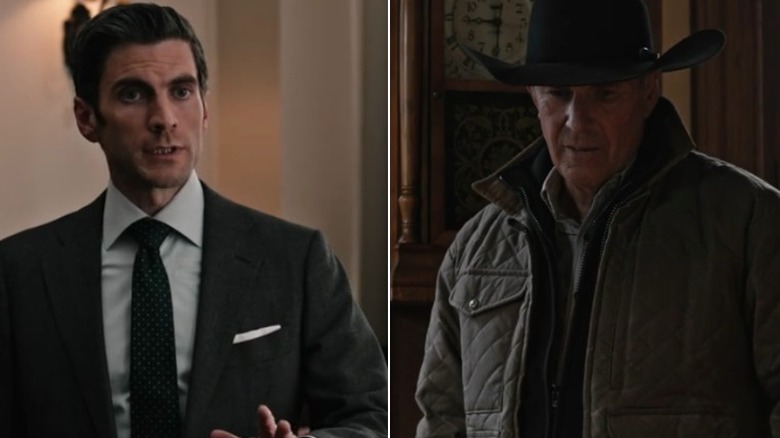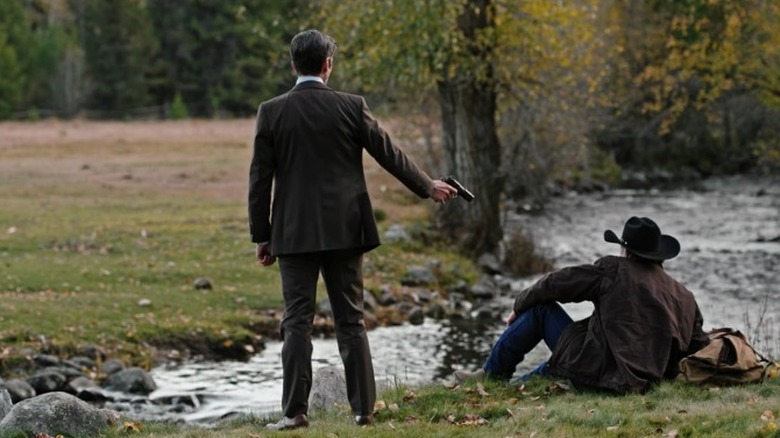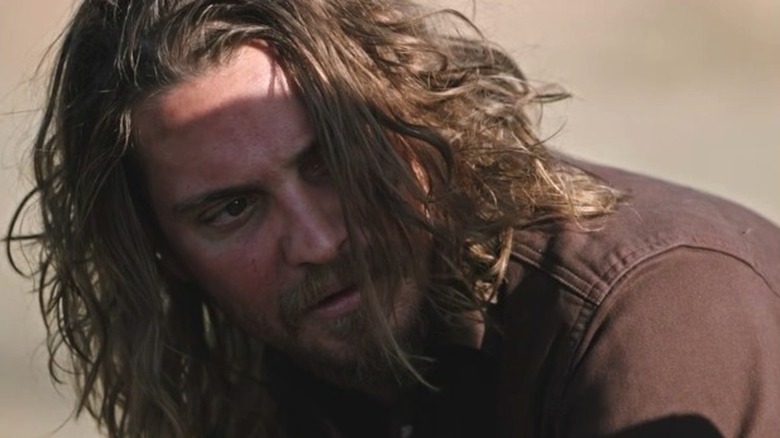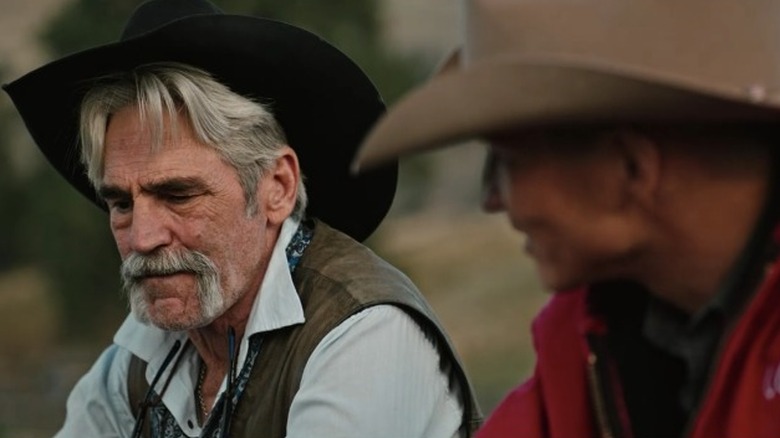Yellowstone Season 4 Ending Explained
On Sunday, January 2, 2022, 10.4 million viewers tuned in for the Season 4 finale of Taylor Sheridan's spinoff-birthing contemporary Western, "Yellowstone" (via The Wall Street Journal). Despite its popularity, the season has garnered its share of criticism, as it gradually evolves into a kind of "Yellowstone Xtreme": three times the fist fights and roping, three times the Beth (Kelly Reilly) one-liners, three times the Coors Light and Dodge Ram product placement, and three times the John Dutton (Kevin Costner) bemoaning the ever-looming loss of his way of life. (In his gubernatorial campaign speech, he literally says, "I am the wall progress hits, and I will not be the one that breaks.")
Although the vast majority of Season 4 plays out more like a succession of Wild West meets modern TV trope vignettes (as opposed to a story tethered to any overarching narrative), the Season 4 finale represents a return to the series' roots. With Episode 10, "Yellowstone" continues to own this collage-like approach, but uses its parade of "completely unhinged, out of pocket" scenes, as one fan called them (via Reddit), to focus on some of the series' more compelling themes. In addition to highlighting its focus on the tension between progress and "old school" conservation, "Grass on the Streets and Weeds on the Rooftops" gives viewers some much-needed reminders about the psychology that drives the three remaining Dutton children, as well as the larger-than-life father figure whose approval dictates their every move.
Yellowstone's finale is all about Beth
Season 4 received some criticism for what many feel is a tired "Flanderization" of one of the show's most compelling characters, Beth Dutton. However, the series finale finally gives viewers a glimpse into the tragedy that drives her, while also reminding them of the shark-like instincts and two-steps-ahead intellect that serves Beth so well in previous seasons.
After angering her father in Episode 9, Beth is so devastated by his disapproval that she begins packing to leave the ranch. For a moment, it looks as though Beth's childish obsession with earning her father's approval will win out over the love and stability she has with Rip (Cole Hauser), but John insists she stay. After losing her mother at a young age (and being made to feel as though it was her fault) Beth becomes determined to make up the loss to her father, and that tragic mentality stays with her. Later on, Beth walks past her new tween charge, Carter (Finn Little), and lashes out at him when he tries to call her "Mama." She projects her own feelings of loss and guilt onto him, and it's difficult to decide who is sadder — the rejected Carter, or the broken little girl speaking from the 35-year-old woman's mouth.
Finally, in the midst of her triumphant manipulation of her long-hated half brother, Beth reminds both Jamie (Wes Bentley) and viewers why she sees him as a man capable of nothing but betrayal and cowardice. Beth has never dealt with the abortion and sterilization she underwent at the age of 15, and she'll forever see her pain as the result of Jamie's actions. The finale's repeated spotlighting of Beth's psychological wounds could mean a return to the nuanced character that so compels audiences in previous seasons.
Yellowstone's season finale reveals the real difference between John and Jamie Dutton
In Episode 4, "Winning or Learning," Jamie explains to Kayce (Luke Grimes) that he's been fighting for the Dutton family from behind the scenes. He's the reason, he reveals, why neither Kayce nor anyone on the ranch faces any charges for the vengeance they enact upon the militia men in Season 3. When Kayce defends their actions by saying "those were the men that attacked our father," Jamie says it doesn't matter. "There is what's just," he says, "and there's the law. They are not the same thing."
In the season finale, John Dutton repeats Jamie's mantra in his conversation with the judge following Summer's (Piper Perabo) over-the-top sentencing. "There's a difference between what's legal and what's just," John says, which strongly implies it's John who teaches Jamie the notion in the first place. The difference, of course, lies in the two men's understanding of which of these often contradictory ideas should ultimately win.
For John, justice takes precedence over legality. For Jamie — a lawyer, as opposed to seasoned rancher — the law wins out over any one individual's understanding of justice. When the law happens to align with John's version of what's right, he can accept Jamie. When the law prohibits John from effectively or efficiently seeking out vigilante justice, he can't. It's a potentially irreconcilable difference, and one made all the more complicated by Jamie's own actions. While John may have piles of bodies and gallons of blood on his hands, it is Jamie, not John, who personally commits two murders in order to protect himself by way of protecting the Dutton's interests.
Things will continue to get worse for Jamie
Season 5 promises to be even worse for the intelligent but emotionally stunted Jamie. After Beth visits the inmate who is hired to kill the Duttons and discovers that Jamie was there, she seeks him out and gives him an ultimatum. She believes that even if Jamie didn't know his father was behind the hit, the reason he didn't "blow his head off" as soon as he found out is that he also wants the Duttons dead. Beth gives Jamie two options: one that ends with him and his father in prison for life, or one that ends with the two dead.
But as Beth's leaving, she offers him a third option. Jamie can cut out the middleman, do what he should have done from the beginning, and kill his own father. Jamie, looking every bit like the conflicted but always-pragmatic "George," ultimately "Lennies" his father by shooting him in the head after they share a touching moment. When Jamie disposes of the body, Beth follows him and snaps a picture. "You should have picked options one or two," she says. Option 3 may save Jamie's life, but, as Beth tells him, "You're ******* mine now."
When Beth returns to the ranch, John demonstrates some semblance of concern for Jamie, thinking Beth hurt him. Jamie is a disappointment, he says, but he still "loves" him (though, apparently, not enough to try and stop Beth from killing him). Just when it looks as though Jamie might wriggle out from underneath the Dutton's thumb, he's pulled back under. Of course, it's unlikely he would ever fully betray them — even without Beth having this leverage — since Jamie's main problem (much like Beth) is that he lives for the approval of John.
Season 4 leaves audiences with big questions about Kayce
Season 4's finale may not be the (literally) explosive cliffhanger of Season 3, but it leaves viewers with plenty of questions. For starters, although Monica (Kelsey Asbille) and Kayce's relationship only occasionally punctuates the background of a handful of the season's episodes, Kayce's vision on the mountain hints at bigger things to come for the couple (like, for instance, an actual storyline for Monica). In addition to having flashbacks to his traumatic time serving as a Navy SEAL, Kayce interacts with three different people during his spiritual journey: his deceased brother, who represents all things Dutton (aka, Kayce's proverbial Devil), Avery (Tanaya Beatty), who represents temptation and infidelity, and an unknown woman, or the human representation of the wolf that sparks his spiritual inquiry in the first place.
Kayce follows the wolf to a crossroads, though the audience isn't shown what lies beyond either path. When Monica asks him what he saw on the mountain, Kayce says, "I saw the end of us." While it's clear that Monica thinks the "us" refers to her and Kayce, we don't actually know. So much of Season 4 hints at a destruction of the Duttons' way of life that it could just as easily point to something outside their marriage. Audiences are left to wonder what exactly Kayce sees after reliving his time as a soldier and denying the first two "temptations" in his vision. Kayce is repeatedly been posited as the most redeemable member of the Dutton family, so it's likely that whatever decision he makes on the mountain will have major consequences for Season 5.
In Episode 10, Jimmy and Lloyd embody Yellowstone's main conflict
Jimmy (Jefferson White) returns to the ranch after finding both love and himself in his temporary reassignment at the Four Sixes Ranch in Texas. For some reason, fired barrel racers Laramie (Hassie Harrison) and Jimmy's ex-girlfriend Mia (Eden Brolin) are at the bunkhouse when he returns with his new fiancée Emily (Kathryn Kelly). In keeping with Season 4's fist fights-before-storylines style, Emily and Mia throw down, and the latter leaves distraught. It's tempting to see the fight as yet another macho, "that's just how it is here" scene, but Jimmy's exhaustion with all the drama of the Dutton ranch is key to his decision to leave it behind.
Jimmy's mentor on the ranch, Lloyd (Forrie J. Smith), struggles to cope with his young friend's decision. Jimmy is leaving behind a life that's imprisoned Lloyd for years, and although he's happy that Jimmy has been able to find happiness, it's a reminder to Lloyd that for him, that ship has sailed. Audiences watch Lloyd spiral into a deep depression in Season 4, and the contrast between his own circumstances and those of the young ranch hand in whom he once saw himself only adds to this.
While Jimmy is able to evolve and see the harm in attempting to hold on to a way of life that doesn't really exist, Lloyd is not. In their opposing understanding of what the Dutton ranch represents, Jimmy and Lloyd illustrate a major theme in "Yellowstone." It's the series' main conflict, and one the finale drives home in both its title and John's conversation with the judge — progression, evolution, and pragmatism vs. tradition, nostalgia, and romanticism.
